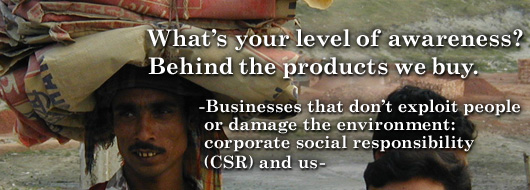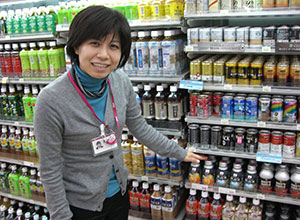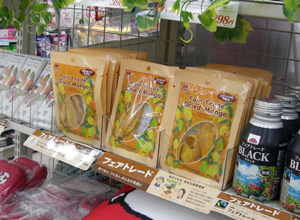No.23 1 Apr. 2009
What’s your level of awareness? Behind the products we buy.

INDEX
- P1What’s your level of awareness? Behind the products we buy.
- P2What familiar companies are doing Sony
- P3What familiar companies are doing Ministop
- P4Social responsibility as consumers.
Electronics and convenience stores too?
-What familiar companies are doing-
Customer reactions can cause change store front.
Ms. Okamura Sachiyo
Ministop Co.,Ltd., management planning division,
CA promotion department, environment promotion manager.
Responding to the growing interest domestically and internationally in CSR activities targeting the production process, we also wanted to take some concrete actions ourselves. The first step we took was to inform company employees about the problems present in the production process. In 2007, we invited the NGOs ACE (Action against Child Exploitation) and Team Choco-Revo, who were closely working with issues of fair trade and child labor, to a round-table discussion with the company president and product development staff.
At the event, NGO members told of the fact that most of the cacao used in Japan comes from West Africa; children are unable to attend school and are subjected daily to the dangerous work of climbing tall trees at the cacao plantations, not even knowing what cacao is used for; some of those children arrive at the plantations via human traffickers. While the product development staff is responsible for determining how to make products which will sell well, they were entirely unaware that such problems existed higher up in the production chain.
And so we launched a project to address the problems of child labor in the locales where cacao is cultivated, leading to the sales of “Belgian Chocolate Soft-Serve Ice Cream Premium” using fair trade cacao. In order to also attract the attention of customers we made up leaflets and point-of-purchase advertisement, and in February 2008, in time for Valentine’s Day, the soft-serve ice cream went on sale on a trial basis at 12 stores in Tokyo.
Actually, Ministop has been selling fair trade canned coffee at all its stores since 2006. However, initially the focus was to “put the product on the shelves and get it sold,” and efforts did not extend to educating customers about fair trade. In fact, at the beginning, some of the people involved thought that “fair trade” was the name of a new product line. With the development and sales of the soft-serve ice cream product, however, we were armed with information about the production areas and we teamed up with NGOs familiar with how to inform people about the problems at hand, so we were able as a corporation to get the message out about fair trade cacao.
Clearing a path for customers.
Most people still do not understand what “fair trade” means when they hear the term. It appears many believe it refers not to paying a fair price to producers, but to a charity that makes donations. Nevertheless, by stocking such products, Ministop hopes to increase awareness about the value of fair trade, clearing a path for customers to follow.
Which is not to discount the force of customer opinion and suggestions. We very much hope that customers will ask for fair trade products at their local Ministop, or will send an inquiry by email, so that we can increase the number of fair trade products we sell. Our staff is very keen to respond to our customers.
What are the proper roles of corporations, NGOs, and consumers?
From the examples of these two corporations, we see that the global CSR movement is effecting change in Japan as well, and companies, in accordance with their own strengths and unique qualities, are implementing programs to take responsibility for what goes on in the production process.
We also see that, while in the past, as with the boycott movements, NGOs and companies were at odds with each other, now more and more companies are making use of NGO knowledge and experience as part of their CSR activities, as demonstrated by the examples of Sony and Ministop. Meanwhile, NGOs are beginning to forge a new relationship with corporations, no longer seeing their influence as merely a major negative force, but as something that can change society for the better. Corporations can be a partner who can introduce a new lifestyle paradigm, one which respects the environment and human rights, to society at large. It is becoming possible for both sides to make use of their strengths, acknowledging each other’s roles in cooperative efforts to bring about a sustainable society.
So, as consumers, from now on, what actions are necessary on our part?

Profile of Ms. Okamura Sachiyo
Started at Ministop Co., Ltd. in 1993. Worked at stores, worked in product development and quality management before starting her current job in 1999. Primarily responsible for environment communication and the environmental management system.

Ministop’s fair trade chocolate and dried mango.
